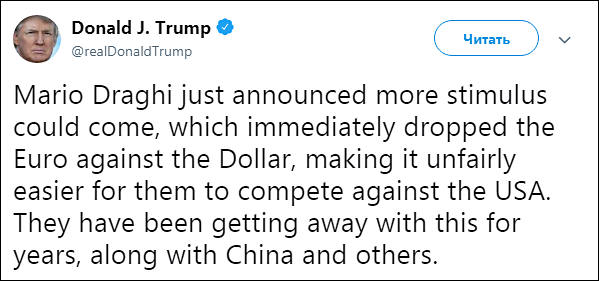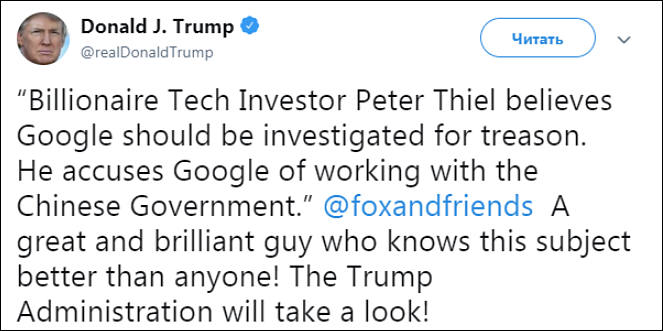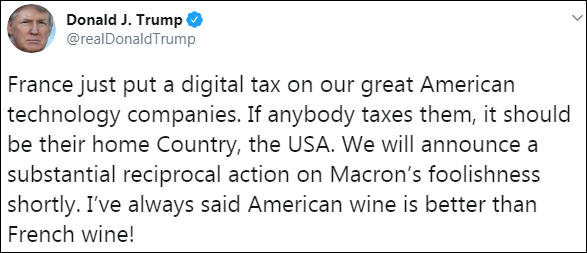
It allows to keep PV going, with more focus towards AI, but keeping be one of the few truly independent places.
-
Chinese telecoms equipment maker Huawei is reviewing its relationship with FedEx Corp after it claimed the U.S. package delivery company, without detailed explanation, diverted two parcels destined for Huawei addresses in Asia to the United States and attempted to reroute two others.
Suddenly :-)
Whole stories of "worldwide corporations who have no relation to national interests" went away instantly.
-
A major scientific society has banned employees of Huawei, the Chinese communications giant, from reviewing submissions to its journals because of U.S. government sanctions against the company.
The New York City–based Institute of Electrical and Electronics Engineers (IEEE) told editors of its roughly 200 journals yesterday that it feared “severe legal implications” from continuing to use Huawei scientists as reviewers in vetting technical papers. They can continue to serve on IEEE editorial boards, according to the memo, but “cannot handle any papers” until the sanctions are lifted.
Just nice.
So, next time someone will tell you about non class and free international science - you can spit at his happy face.
-
Most folks do not realize that ~35% of 5G network equipment' s (that is the network gear that Verizon, AT&T, Sprint, T-Mobile, Orange, KPN, you name the mobile operator) core technical specifications are based on Huawei's technical contributions (and therefore intellectual property) at ITU's 3GPP (the International engineering organization that is responsible for the 3G, LTE and 5G specs). In a network deployment, it is the responsibility of the UE chipset vendor (your and mine's future 5G smartphone for example) to interoperate with the network edge (Huawei or Ericsson or Nokia's base station). It is not clear what the likes of Qualcomm or what not are going to do now? Throw over the wall and hope for the best on interoperability?
-
New moves
On June 10th, the United States will impose a 5% Tariff on all goods coming into our Country from Mexico, until such time as illegal migrants coming through Mexico, and into our Country, STOP. The Tariff will gradually increase until the Illegal Immigration problem is remedied at which time the Tariffs will be removed. Details from the White House to follow.
White House warned that it will hike Mexico tariffs to 25% by October 1, if the border crisis persists.
The U.S. imported almost $350b worth of goods from Mexico in 2018.
Trump gradually reduce US citizens real consumption. May be under MAGA times he meant 19th century?
Border crisis can be solved only by solving the only cause of it - extreme inequality. Of course, as I said above Trump is doing something in this regard by making US citizen more and more poor each month, but too slow, and to small.
-
Much like their counterparts in the component industry, server companies would be devastated by losing access to the Chinese market at large. "China reportedly plans to boycott products from U.S.-based chip suppliers including Intel. China has contributed around a quarter of Intel data center business group's revenues." Losing that large a revenue source is bound to be problematic.
-
US public corporations have quarterly financial reporting, so it is always a 3 month race. If you miss the top and/or bottom lines, may be CEO/CFO will be willing to wait for 1 more quarter assuming they buy into your plan B. Two quarters of missed targets, then headcount reduction is next for the base of the pyramid. I have been there, as head of several product lines, it was ugly, stressful on all fronts. Now, 70% of US GDP is hinged on US consumers. If US consumers start spending less, the GDP is going to take a hit at a time when debt is $22T. Less spending, fewer people needed, more store closing, increased house and car mortgage defaulting, fewer tax revenues, not withstanding more sick people with no health insurance and possible bank problems are next?
-
Sounds like usual capitalism stuff :-)
-
U.S.-China Trade War Portends Painful Times for U.S. Semiconductor Industry
Tight trade policies, these semiconductor industry veterans expect, will hurt the U.S. industry more than China. “The consumption of semiconductors in China is 40 to 50 percent” of the world supply, said French. “And that number is going to go up whether we sell to them or not.” Can China’s tech industry really do just fine without U.S. chips? The panelists debated the question.“I think China is going to struggle with memory,” Hutcheson said. “In memory, the costs are in the equipment and the efficiencies of running the fab; only 5 percent of the cost is labor. That is going to be difficult for them, to have to get materials and equipment from around world.” -
MacBook maker says moving out of China 'no cheaper' than tariffs
TAOYUAN, Taiwan -- Key MacBook and Apple Watch maker Quanta Computer on Tuesday warned that the logistical costs of shifting consumer electronics production out of China could prove as expensive as the tariffs themselves. "It is not just about moving equipment from here to there," Quanta Vice Chairman C.C. Leung said at a press conference ahead of an earnings call. "You need to have a cluster of supply chains in place, otherwise the logistics may not be any cheaper than the tariffs."Quanta is the largest laptop maker in the world, supplying not only Apple but also HP, Dell and others. It is also a major builder of data center servers for Facebook, Google, Microsoft and Amazon and Twitter."I would very much love to build another plant in the U.S. However, it's not likely to build consumer electronics over in the U.S. as it would be too expensive and there isn't sufficient supply chain support," Lam said.A similar logic applies to production in Taiwan, Lam continued. He sees the island becoming a suitable place to build servers due to its relatively mature supply chains for those higher-value products, but not an ideal place to make consumer electronics, as their production is still quite labor intensive and requires more components to build.Quanta did not rule out the possibility of allocating production to Southeast Asian countries, as its peers are doing -- Pegatron in Indonesia, Compal Electronics in Vietnam and Wistron in the Philippines. "However, the supply chains would be too scattered if one [manufacturer] goes to Indonesia, while the other ones go to Vietnam or the Philippines," Leung said. "It might not be necessary to shift production away if the costs would be higher [than the tariffs]." -
For all of the money we are spending, NASA should NOT be talking about going to the Moon - We did that 50 years ago. They should be focused on the much bigger things we are doing, including Mars (of which the Moon is a part), Defense and Science!
I think issue with Mexico had been that he considered it to be part of China, but now confusion is resolved
President Trump backed off his plan to impose tariffs on all Mexican goods and announced via Twitter on Friday night that the United States had reached an agreement with Mexico to reduce the flow of migrants to the southwestern border.
-
Fake Negotiations
James H. Nolt Adjunct Professor at New York University
Once again U.S.-China trade negotiations are at an impasse after numerous promises month after month that they were near a solution. Nearly everybody commenting on this is wondering what went wrong, yet few have even imagined the most likely answer: these negotiations are fake. They are intended to fail.Nearly every pundit seems to believe that Trump genuinely wants an agreement. I have doubted that since the beginning. His aim all along has been to find an excuse to impose extraordinary tariffs, which he clearly believes benefit the U.S. economy and himself politically. The tariffs are not, for Trump, mere bargaining chips. They are not a means to an end, as many U.S. business interests vainly hope. Tariffs are an end in themselves for Trump. The negotiations are fake because Trump has no intention of trading them away. There is nothing he wants more than to continue the tariffs indefinitely. Even some of Trump’s own negotiators may not realize this, though the pattern ought to start to dawn on them soon.https://www.chinausfocus.com/foreign-policy/fake-negotiations
War With the World: Trump Puts Tariffs on India
Mr. Trump on Friday said India would be removed from the U.S.’s privileged-trading program called the Generalized System of Preferences on Wednesday. Under the decadeslong program meant for some developing economies, the U.S. had allowed India to avoid tariffs on certain exports to the U.S. in the interest of promoting tighter trade ties and development.India, the U.S.’s ninth-largest trading partner, is a top beneficiary of the GSP program. Mr. Trump’s move will add tariffs of as much as 7% on Indian exports of goods like chemicals, auto parts and tableware to the U.S., which in 2018 accounted for more than 11%, or $6.3 billion, of India’s total exports of goods valued at $54.4 billion, according to the Congressional Research Service, a research agency for the U.S. Congress. -
India joins
India just increased tariffs on US exports, dealing another blow to fragile global trade.
The tariffs on several US products will go into effect on June 16, India's Finance Ministry said in a statement Saturday. The goods targeted include American apples — which will be hit with a 70% tariff — as well as almonds, lentils and several chemical products.
-
And back to old methods
In an April speech in New York, FBI Director Christopher Wray described the reason for the scrutiny of ethnic Chinese scientists. “China has pioneered a societal approach to stealing innovation in any way it can from a wide array of businesses, universities, and organizations,” he told the Council on Foreign Relations. Everyone’s in on it, Wray said: China’s intelligence services; its state-owned and what he called “ostensibly” private enterprises; and the 130,000 Chinese graduate students and researchers who work and study in the U.S. every year. “Put plainly, China seems determined to steal its way up the economic ladder at our expense.”
-
in fact, wasn't much of the wealth of the West stolen from China, India, Africa, rest of the world? :)
In 1820, before the first Opium War, China's economy was the largest in the world, ... Furthermore, China was a net exporter, and had large trade surpluses with most Western countries. Within a decade after the end of the Second Opium War, China's share of global GDP had fallen by halfhttps://en.wikipedia.org/wiki/Opium_Wars
James Bradley, ( author, Flags of our Fathers ) : The American Industrial Revolution was funded by huge pools of money... it came from illegal drugs in the biggest market in the world , China. Host: the ( great) grandfather of .... the most liberal president, Franklin Delano Roosevelt was a drug runner? Bradley: Yes sir!
see first 4 minutes, excerpt from The Coming War on China
full film below
-
Good news
Report commissioned by The Consumer Technology Association, a consumer trade organization, states that the Trump administration’s proposed tariffs on imported goods from China would raise the U.S. price of laptops and tablets by 19%.
Next impact will be on lot of reexporting firms and post services and will be 10-30 billions of USD.
-
H-1B work visas war
The United States has told India it is considering caps on H-1B work visas for nations that force foreign companies to store data locally.
Two senior Indian government officials said on Wednesday they were briefed last week on a U.S. government plan to cap H-1B visas issued each year to Indians at between 10% and 15% of the annual quota. There is no current country-specific limit on the 85,000 H-1B work visas granted each year, and an estimated 70% go to Indians.
So, Amazon clouds are not so neutral after all. Store data where CIA and other agencies can access them freely - and US loves you.
-
( maybe same paper used on Chairman Mao's Red Book? :)
Publishers Plead With Trump Not to Impose a China ‘Bible Tax’
Proposed tariffs on $300 billion in Chinese goods would include printed materials, which would especially affect Bibles and children’s books predominantly produced in China because of the unique paper, printing technology and skills needed, company and trade group officials testified during the second day of a seven-day hearing on the proposed duties Tuesday.“We believe the administration was unaware of the potential negative impact these proposed tariffs would have on Bibles and that it never intended to impose ‘a Bible tax’ on consumers and religious organizations,” Mark Schoenwald, chief executive officer of HarperCollins Christian Publishing, told a panel of officials at the U.S. International Trade Commission.A 25% tariff would make it difficult to continue printing some formats and raise prices, leading to a Bible shortage that would hurt the Christian bookseller market, as well as ministries, churches, nonprofits and other religious organizations that couldn’t afford them, Schoenwald said. -
The Commerce Department issued export restrictions that cut five major Chinese supercomputer developers off from US technology. According to the new rule, the firms have been "acting contrary to the national security or foreign policy interests of the United States." The developers include Sugon of Beijing, three of its affiliates and Wuxi Jiangnan Institute of Computing Technology.
CPU and supercomputer businesses are extremely profitable. And getting some real competition on world market is very dangerous.
-
Apple is reportedly shifting production for its new Mac Pro computer from the United States to China.
The company's latest Mac Pro computer will not undergo final assembly in Austin, Texas, as its previous version did, according to a Wall Street Journal report. Apple (AAPL) will now partner with Quanta Computer in China — closer to Apple's other factories. The effort could help reduce costs related to shipping components to the United States for the last production step, the report said. The move comes amid growing trade tensions between the Trump administration and China.https://www.cnn.com/2019/06/28/tech/apple-mac-pro-production-china/index.html
-
New developments - Japanese trade war with South Korea
Japan's new export controls on South Korea, a country that produces the bulk of the world's memory chips, threaten a ripple effect that spreads beyond the two wary neighbors to electronics manufacturing globally.
The restrictions announced Monday mark the latest setback in a bilateral relationship fraught with colonial-era grievances. The move prompted Seoul to say it was considering retaliatory measures and left chipmakers to confront an immediate supply challenge.
Starting Thursday, Japanese suppliers must seek approval for individual exports of three semiconductor industry chemicals to South Korea. Japan's government expects export reviews to take about three months. But South Korean chipmakers typically keep only one to two months' worth of parts and materials in stock.
-
Our representatives have just returned from China where they had constructive talks having to do with a future Trade Deal. We thought we had a deal with China three months ago, but sadly, China decided to re-negotiate the deal prior to signing. More recently, China agreed to...buy agricultural product from the U.S. in large quantities, but did not do so. Additionally, my friend President Xi said that he would stop the sale of Fentanyl to the United States – this never happened, and many Americans continue to die! Trade talks are continuing, and...during the talks the U.S. will start, on September 1st, putting a small additional Tariff of 10% on the remaining 300 Billion Dollars of goods and products coming from China into our Country. This does not include the 250 Billion Dollars already Tariffed at 25%......We look forward to continuing our positive dialogue with China on a comprehensive Trade Deal, and feel that the future between our two countries will be a very bright one!
Finally some progress.
Howdy, Stranger!
It looks like you're new here. If you want to get involved, click one of these buttons!
Categories
- Topics List23,993
- Blog5,725
- General and News1,354
- Hacks and Patches1,153
- ↳ Top Settings33
- ↳ Beginners256
- ↳ Archives402
- ↳ Hacks News and Development56
- Cameras2,368
- ↳ Panasonic995
- ↳ Canon118
- ↳ Sony156
- ↳ Nikon96
- ↳ Pentax and Samsung70
- ↳ Olympus and Fujifilm102
- ↳ Compacts and Camcorders300
- ↳ Smartphones for video97
- ↳ Pro Video Cameras191
- ↳ BlackMagic and other raw cameras116
- Skill1,960
- ↳ Business and distribution66
- ↳ Preparation, scripts and legal38
- ↳ Art149
- ↳ Import, Convert, Exporting291
- ↳ Editors191
- ↳ Effects and stunts115
- ↳ Color grading197
- ↳ Sound and Music280
- ↳ Lighting96
- ↳ Software and storage tips266
- Gear5,420
- ↳ Filters, Adapters, Matte boxes344
- ↳ Lenses1,582
- ↳ Follow focus and gears93
- ↳ Sound499
- ↳ Lighting gear314
- ↳ Camera movement230
- ↳ Gimbals and copters302
- ↳ Rigs and related stuff273
- ↳ Power solutions83
- ↳ Monitors and viewfinders340
- ↳ Tripods and fluid heads139
- ↳ Storage286
- ↳ Computers and studio gear560
- ↳ VR and 3D248
- Showcase1,859
- Marketplace2,834
- Offtopic1,320









